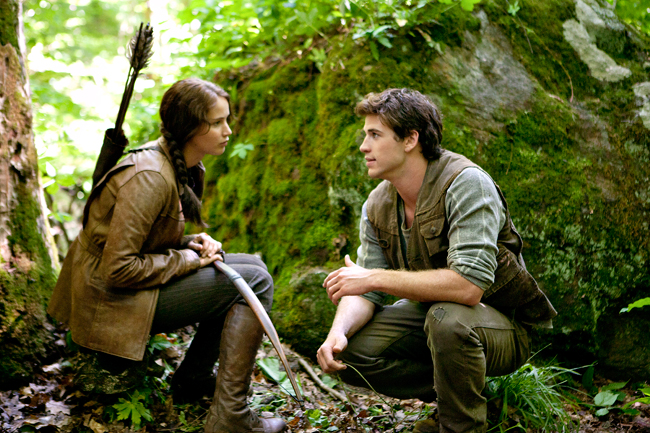With any book-to-film adaptation, there’s bound to be lots of disappointed grumbling about how the film doesn’t live up to the book, and “The Hunger Games,” written by Suzanne Collins, certainly lives up in that regard. The film often feels like a CliffNotes version of its source material, and glosses over much of its character nuance. However, as with any adaptation, it’s important to remove the film from its novelistic origin and decide how the film stands on its own merits. Thankfully, “The Hunger Games” is a solid, entertaining beginning to what’s sure to be an insanely profitable franchise.
“The Hunger Games” sets up its concept concisely, via an opening scroll of text that tells of a steely Capitol that punishes its dozen districts for a quashed rebellion by forcing them to offer up adolescent “tributes” to compete in the hunger games, an extended fight to the death that’s televised across the nation. Our heroine, Katniss Everdeen (Jennifer Lawrence), comes from District 12, a dilapidated state of coal miners, and when her younger sister is chosen for the games, Katniss volunteers to take her place.
It’s easy to argue that “The Hunger Games” is at its strongest in this early section, and it’s clear that director Gary Ross is most comfortable with this tender, innately human setting. Ross’ previous directing credits include “Seabiscuit” and “Pleasantville,” so it makes sense that many of the film’s most resonant moments come about in the character-driven first act. Ross gives District 12 its own visual stamp, filming it naturalistically and giving the characters a quiet, beaten-down dignity. His staging of the “reaping” (an assembly where citizens are chosen for the games) is elegantly horrifying, especially as the citizens are herded into the center of town like cattle being sent to slaughter.
Once Katniss and fellow games tribute Peeta (Josh Hutcherson) move to the Capitol and then on to the main event, Ross gives each section of the film its own visual dynamic, filming the Capitol as a freak show filled with people dressed like fools and ignorant to the citizens suffering in the districts around them, while the games are portrayed in equal parts action film and tragic drama. The games themselves are the film’s most dynamic portion, and Ross does well tiptoeing around the material’s inherent brutality while still making it dramatic and interesting.
Ross makes the smart decision to let the audience peek into the control center of the hunger games, run by Crane (Wes Bentley), and also dips into its wide supporting cast for reactions to what’s going on in the arena. Strong character actors like Donald Sutherland, Stanley Tucci, Woody Harrelson and Elizabeth Banks all pop up here. While one hopes they’ll play bigger parts in the inevitable sequels, each and every one of them makes an impression here.
Lawrence proves to be a great choice for Katniss, and she seems to be relishing playing a well-rounded female protagonist, something that many films of this ilk (looking at you, “Twilight”) forget to include. Katniss is fiery and charismatic, and Lawrence plays all those notes wonderfully, but her best moment is just before she’s sent into the games, as Katniss shakes with fear and deals with her possible impending death. It’s a subtle, smartly observed moment — one where Lawrence proves she was the right pick for the role.
The love triangle that develops between Katniss, her hometown sweetheart Gale (Liam Hemsworth) and Peeta is the least interesting part of “The Hunger Games” franchise by a long measure, and the film suffers when it dips its toes into that well of melodrama, both in terms of story and performance. Hutcherson gets a few chances to play charming, and while Hemsworth seems to be well-cast as Gale, he completely fails to build a character here.
“The Hunger Games” is effective as a setup for a franchise, but it also works on its own terms, as a story about government oppression, as the cinematic event it’s being hyped as and as a major coming-out party for Lawrence. As an adaptation, it’s a fairly typical cut-and-paste (author Suzanne Collins co-wrote the screenplay), but compelling enough to leave established fans and newcomers hungry for more.
Printed on Thursday, March 22, 2012 as: Compelling adaptation lacks character nuance





















